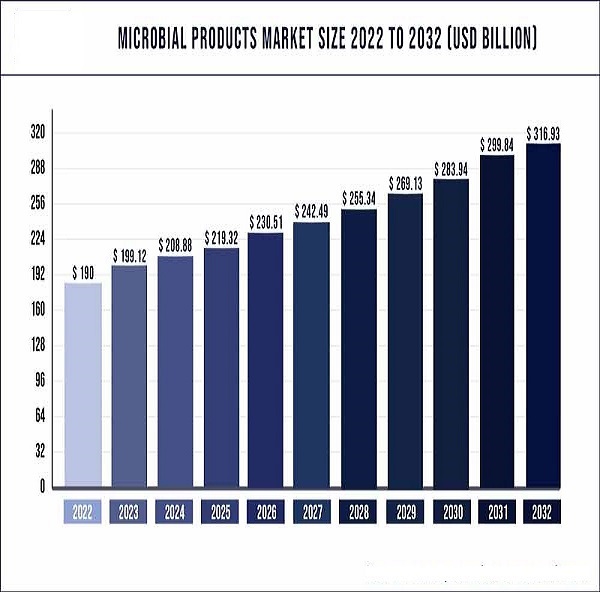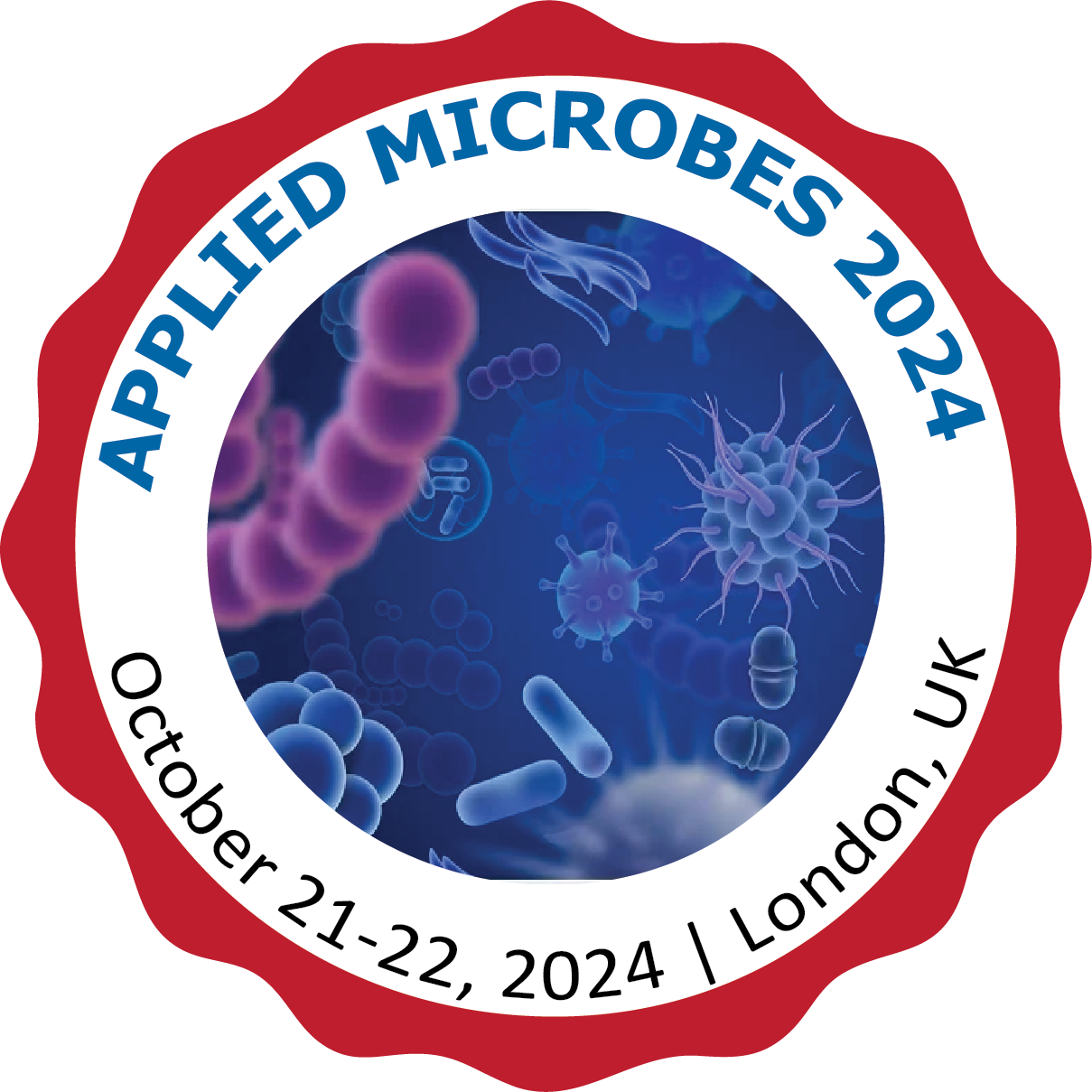About conference
Welcome to the 9th World Conference on Applied Microbiology and Beneficial Microbes
We are delighted to invite you to the 9th World Conference on Applied Microbiology and Beneficial Microbes, a leading international platform for exploring the latest advancements in the field. This prestigious event, scheduled to take place from October 21-22, 2024 at London ,UK will bring together experts, researchers, and enthusiasts from around the globe to share insights, exchange ideas, and foster collaborations.
About Us:
Our conference is dedicated to the remarkable realm of applied microbiology and its profound impact on diverse sectors. From healthcare and agriculture to environmental preservation and biotechnology, microorganisms play pivotal roles in shaping a sustainable future. With a rich history of successful editions, we continue our mission to promote the exchange of knowledge and innovation within the realm of beneficial microbes.
What to Expect:
Expect an engaging lineup of keynote speakers, panel discussions, workshops, and poster presentations that span the entire spectrum of applied microbiology. Our sessions will cover cutting-edge research, novel technologies, and practical applications, providing attendees with a comprehensive understanding of the field's latest trends.
Why Attend:
-
Networking: Connect with peers, experts, and industry leaders, expanding your professional circle and fostering potential collaborations.
-
Knowledge Exchange: Gain insights from thought-provoking discussions, interactive sessions, and firsthand experiences shared by distinguished speakers.
-
Innovation Showcase: Explore emerging technologies, research findings, and industry solutions that are driving advancements in applied microbiology.
-
Career Enhancement: Enhance your career prospects by staying updated on the most recent breakthroughs and connecting with potential employers or partners.
Who Should Attend?
Researchers, academics, industry professionals, students, and anyone interested in the dynamic world of applied microbiology and its transformative effects on various sectors.
Join us at the 9th World Conference on Applied Microbiology and Beneficial Microbes, where knowledge meets innovation, and together, we pave the way for a more sustainable and interconnected future. We look forward to welcoming you to London ,UK this October 21-22, 2024.
Register now to secure your spot in this enlightening journey of discovery and progress.
Sessions and Tracks
Track 1: CRISPR and Microbial Engineering:
The field of CRISPR and microbial engineering has rapidly evolved, presenting transformative possibilities across various sectors, including medicine, agriculture, and biotechnology. CRISPR technology, a revolutionary gene-editing tool, allows scientists to modify microbial genomes with unprecedented precision and efficiency. This capability is not only advancing our understanding of microbial biology but also enabling the development of microbes engineered to perform specific tasks. For instance, engineered microbes are now being used to produce biofuels, synthesize pharmaceuticals, and create new treatments that target genetic diseases. Additionally, the application of CRISPR in agriculture is leading to the development of microbial solutions that enhance crop resilience and yield by conferring resistance to pests and diseases. The ongoing advancements in CRISPR and microbial engineering hold promise for solving some of the most pressing challenges in health, sustainability, and industry.
Track 2: Microbiome Therapeutics:
The exploration of microbiome therapeutics represents a groundbreaking shift in modern medicine, highlighting the potential of harnessing the human microbiome to treat a wide array of diseases. Microbiome therapeutics involve the manipulation of the community of microbes that inhabit our bodies, primarily in the gut, to maintain or restore health. This area of research has shown promising results in treating conditions such as inflammatory bowel disease (IBD), obesity, and even neurological disorders like depression and anxiety. Innovations include the development of probiotics with targeted functionalities, fecal microbiota transplants (FMT) for restoring bacterial balance, and prebiotics that stimulate the growth of beneficial bacteria. These therapies leverage the intricate relationships between microbes and human health, offering a more natural and holistic approach to disease management. As research progresses, microbiome therapeutics could redefine treatment paradigms across multiple health disciplines, emphasizing prevention and healing aligned with our biological ecosystem.
Track 3: Synthetic Biology in Microbial Production:
Synthetic biology is reshaping microbial production, driving innovations in manufacturing essential products more sustainably and efficiently. This field involves engineering microbes to enhance their natural abilities or to endow them with new functions. Such capabilities are pivotal in producing pharmaceuticals, where microbes are engineered to synthesize complex molecules for new drug development. In the biofuel sector, tailored microbes convert biomass into bioethanol and biodiesel, providing eco-friendly energy alternatives. Additionally, in bioplastics production, synthetic biology enables microbes to produce biodegradable materials, reducing environmental pollution. This integration of engineering with biology not only optimizes production processes but also opens new avenues for addressing global challenges in health, energy, and environmental sustainability.
Track 4: Environmental Microbiology:
Environmental microbiology plays a crucial role in understanding and managing Earth's ecological systems, focusing on the interactions of microorganisms with their environments. This field examines how microbes affect soil and water quality, influence climate change, and contribute to the biodegradation of pollutants. One of the key applications is in bioremediation, where microbes are used to clean up contaminated sites by breaking down hazardous substances into less harmful products. Additionally, environmental microbiology studies microbial processes in natural environments, which are vital for nutrient cycling and ecosystem health. These insights are also pivotal for innovations in waste management, such as the microbial conversion of organic waste into valuable bioproducts, enhancing sustainability and reducing environmental footprints.
Track 5: Microbial Interactions and Pathogenicity:
Microbial interactions and pathogenicity delve into the intricate relationships between microorganisms and their hosts, often exploring the mechanisms by which microbes cause disease. This field encompasses the study of both harmful pathogens and beneficial symbiotic microbes, aiming to understand their behaviors and effects on host organisms. Researchers investigate how pathogens colonize and invade host tissues, evade immune responses, and manipulate host cellular processes to cause disease. Conversely, symbiotic interactions between microbes and hosts are also explored, shedding light on mutualistic relationships that confer benefits to both parties. Through unraveling these complex interactions, scientists gain insights into disease mechanisms, develop strategies for controlling infections, and uncover potential avenues for therapeutic interventions aimed at modulating microbial communities within the body.
Track 6: Industrial Applications of Microbes:
-
Microbes are integral to various industrial processes, serving as biocatalysts in the production of a diverse range of products.
-
Fermentation processes utilize microbes to convert raw materials into products like beer, wine, cheese, and bread.
-
Microbial enzymes play a vital role in industries such as textiles, where they enhance fiber breakdown and improve dyeing and finishing processes.
-
Bioremediation employs microbes to clean up environmental pollutants, offering a sustainable solution to contamination issues.
-
Microbial bioplastics production presents an eco-friendly alternative to conventional plastics, reducing environmental impact.
-
Biopharmaceuticals derived from microbial fermentation processes offer innovative treatments for various diseases.
-
Microbial biofuel production contributes to the development of renewable energy sources, reducing reliance on fossil fuels.
-
Microbial biosensors are utilized in industries for rapid and sensitive detection of contaminants, ensuring product safety and quality.
Track 7: Antimicrobial Resistance (AMR):
Antimicrobial Resistance (AMR) poses a significant threat to global health, as microorganisms adapt to withstand the effects of antimicrobial drugs. This renders standard treatments ineffective, leading to prolonged illnesses, increased healthcare costs, and elevated mortality rates. Contributing factors to AMR include the overuse and misuse of antibiotics in healthcare, agriculture, and veterinary practices, alongside inadequate infection prevention measures.
Addressing AMR requires a collaborative effort from healthcare providers, policymakers, researchers, and the public. Strategies include promoting responsible antibiotic use, developing alternative treatment options, enhancing surveillance systems, and implementing infection control measures. By collectively addressing AMR, we can ensure effective treatment of infectious diseases and preserve the efficacy of antimicrobial drugs for future generations.
Track 8: Advances in Probiotics and Functional Foods:
Advances in Probiotics and Functional Foods represent promising avenues in healthcare and nutrition. Probiotics, beneficial bacteria that confer health benefits when consumed, have garnered attention for their potential to improve digestive health, boost immunity, and even alleviate symptoms of certain conditions like irritable bowel syndrome (IBS). These microorganisms are increasingly incorporated into various food products, including yogurt, kefir, and fermented vegetables, to promote gut health and overall well-being.
Functional foods, fortified with additional nutrients or bioactive compounds, offer enhanced health benefits beyond basic nutrition. From fortified cereals and beverages to snacks and dairy products, functional foods are designed to target specific health concerns such as cardiovascular health, bone strength, and cognitive function. By harnessing the power of probiotics and functional ingredients, consumers can make informed choices to support their health and vitality.
Track 9: Microbial Diagnostics and Disease Prediction:
Microbial Diagnostics and Disease Prediction represent cutting-edge approaches in healthcare, enabling early detection and prevention of infectious diseases. Through advanced molecular techniques, such as polymerase chain reaction (PCR) and next-generation sequencing (NGS), healthcare professionals can rapidly identify pathogens and characterize their genetic profiles. These diagnostics not only facilitate prompt and accurate treatment decisions but also aid in surveillance efforts to track disease outbreaks and monitor antimicrobial resistance patterns.
Moreover, microbial markers hold promise for predicting disease susceptibility and progression. By analyzing the microbiome composition and metabolic activity, researchers can identify signatures associated with various health conditions, including inflammatory bowel disease (IBD), obesity, and cancer. Integrating microbial diagnostics into personalized medicine approaches may enable proactive interventions tailored to individual risk profiles, ultimately improving health outcomes and reducing the burden of infectious and non-communicable diseases.
Track 10: Bioinformatics and Data-Driven Microbiology:
Bioinformatics and data-driven microbiology are revolutionizing the study of microorganisms through advanced computational tools and large-scale data analysis. These technologies enable researchers to decode complex microbial genomes, understand microbial communities, and explore their functions in various environments. This integration of big data and computational methods helps in identifying new drug targets, developing personalized medicine, and predicting microbial behavior in response to environmental changes.
Furthermore, machine learning and AI technologies are enhancing predictive capabilities in microbiology. By analyzing vast datasets from genomic sequencing and microbial interactions, these tools can predict disease outbreaks, optimize antibiotic treatments, and guide biotechnological innovations. This approach not only accelerates scientific discovery but also improves the precision and efficiency of microbial research, fostering developments in healthcare, agriculture, and environmental management.’
Track 11: Microbial Diversity and Taxonomy:
Microbial Diversity and Taxonomy are fundamental areas of study that explore the vast array of microorganisms present in various environments around the world. This field focuses on identifying, classifying, and understanding the ecological roles of microbes, from bacteria and fungi to archaea and viruses. Researchers utilize molecular techniques such as DNA sequencing to unveil the rich diversity of microbial life, which is crucial for ecological balance and biotechnological applications.
Understanding microbial taxonomy is vital for ecological studies, medical microbiology, and industrial processes. Proper classification aids in tracking microbial evolution, discovering new species, and elucidating their relationships and functions within ecosystems. These insights help in managing natural resources, improving agricultural practices, and developing new medical therapies and diagnostics, showcasing the importance of microbial taxonomy in enhancing our understanding of the natural world.
Track 12: Microbial Diversity and Bioprospecting:
Microbial Diversity and Bioprospecting delve into the untapped potential of microorganisms, exploring their capabilities to yield innovative biotechnological solutions. Researchers harness the vast diversity of microbes, which inhabit everything from ocean depths to volcanic springs, to discover novel enzymes, antibiotics, and bioactive compounds. This exploration not only enhances our understanding of microbial ecosystems but also catalyzes advances across medicine, agriculture, and environmental management.
The practice of bioprospecting involves identifying and utilizing unique microbial traits to address global challenges. By extracting and refining these biological resources, scientists can develop new pharmaceuticals, improve crop resistance, and innovate bio-based technologies, positioning microbial bioprospecting as a cornerstone of sustainable development and scientific breakthroughs.
Market Analysis
The global microbial products market, valued at USD 190 billion in 2022, is projected to reach USD 316.93 billion by 2032, growing at a CAGR of 5.30%. Microbes are primary producers of beneficial compounds used in medicines, including anticoagulants, antidepressants, herbicides, and vitamins. These products are crucial in pharmaceuticals and healthcare due to their beneficial attributes.
Microbes also play a vital role in food production, affecting flavors and consistency through metabolites. Starter cultures are used in industrial food manufacturing to ensure desired microbial balance. The market's growth is driven by rising demand for diagnostic microbiological products, healthcare nutrients, and treatments for diseases like cancer. Genetic engineering and fermentation technology advancements further boost market expansion.
Microbial healthcare products are increasingly utilized in both primary and secondary healthcare systems for immunization, disease prevention, chemotherapy, and treatment of infectious diseases. The development of genetic recombinant technology has enabled the production of more economical and environmentally friendly microbial products, particularly in the enzyme manufacturing sector for industries like paper, leather, and food preservation.
Biogas production from microbial action, primarily methane, is significant in rural areas due to the availability of livestock dung. The bacterial segment dominates the market, producing various commercially valuable substances used in household and personal care products.
Fungi contribute to human nutrition and food production through fermentation and secondary metabolites used in medicines. Viruses serve as vectors in medical and agricultural applications, offering potential in pharmaceuticals, cosmetics, and electronics.
North America holds the largest market share due to high demand in the pharmaceutical sector, advanced R&D technologies, and substantial healthcare spending. Europe is the second-largest market, driven by the use of microbial products in biological pest and plant disease management.
















